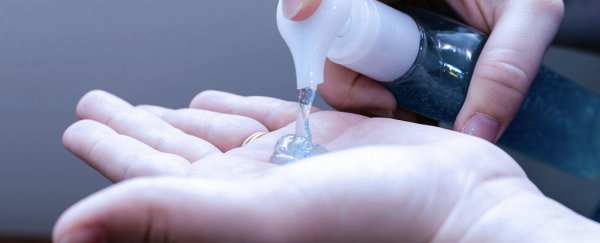Many humans have gone way too far in their need to have squeaky clean, completely germ-free hands at all times.
And while alcohol-based hand sanitiser is the least problematic choice, now it turns out it could get you in trouble with law enforcement.
Results from a small experimental study show that alcohol vapour from hand sanitiser used by the person administering a breath test can lead to false positives and produce error codes in the equipment - and this has real implications for how police use breathalysers in the US and many other countries around the world.
Science is clear on the fact that you can't absorb enough hand-sanitising alcohol through your skin to make you appear drunk on a breath test.
But it's a different situation if the person administering your test used sanitiser to be more hygienic.
A pair of researchers from the Missouri Department of Health and Senior Services tested 65 stone-cold sober individuals in three groups, using one of three common breathalyzer machines on each group.
The test operators would apply a standard amount of either gel- or foam-based alcohol hand sanitiser and rub their hands until dry. Then they proceeded with unwrapping the disposable mouthpiece and holding it while subjects performed the breath test.
The final results showed that 10 percent of initial tests yielded a positive breath alcohol result despite the subjects being completely sober.
Furthermore, 31.5 percent of tests ended up with error codes, as the presence of alcohol vapour messed up the measurements.
Additionally, a smaller test with just ten subjects showed that if the operator waited five minutes between hand rub application and administering the breath test, there were no false positives.
These results fall in line with previous research that has indicated similar outcomes, although in those cases the breathalysers tested were not the same as ones routinely used by the police in the US.
But taken together, these findings point to a need of adjusting common practices, so that people don't end up falsely accused of being intoxicated.
"[I]t would be advisable to train officers regarding this possibility and potentially update methodologies for the collection of breath alcohol test results," the researchers write in the study.
Additionally, the scientists advise it might be prudent to review the habit of keeping alcohol-based hand sanitiser around fingerprinting devices in the law enforcement office.
Not only does this practice often land them near the breathalyser machine, but apparently some non-alcohol based hand sanitisers can even improve the quality of fingerprint scans.
Although given the antibiotic resistance crisis, maybe more people should just wash their hands with good old soap and water.
The study was published in the Journal of Forensic Sciences.
